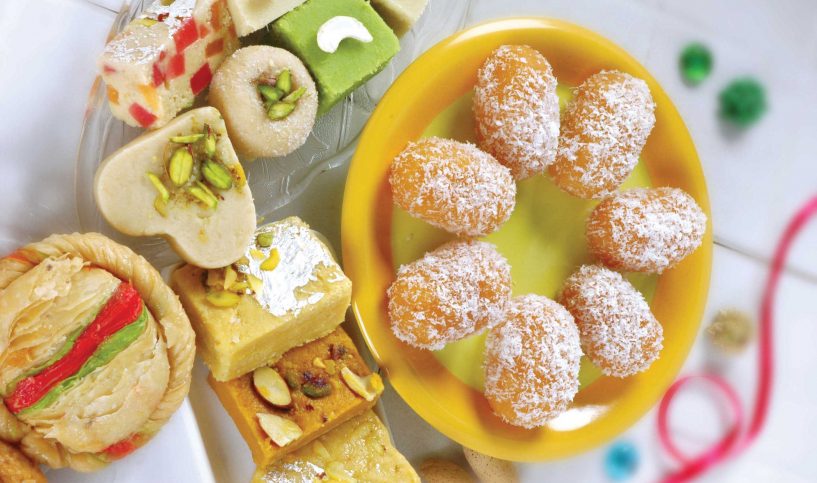Eid-al-Adha is the ultimate holiday, provided you celebrate it in your home country with close family and friends. Traditional holidays flourish in your traditional landscape, whereas Eid as an expat in a Muslim country means a few days off work and the chance to visit co-workers if you wish; in the secular west, where religion is often a private matter, Eid can be as bleak as taking the morning off work for prayer at an Islamic center, and, being unable to find goat, thawing a grocery-store leg of lamb on the counter to eat alone later, as festive as a single candle on a cupcake for a party-less birthday.
My life’s few eventful Eid-al-Adhas have been celebrated in my mother-in-law’s house in Pakistan, where this Eid — the big one — unselfconsciously, and without being derivative in any way, compounds so many elements from my favorite American holidays. Goats or cows are spangled in colorful array like Christmas trees. Later they are slaughtered at home, their blood spilling onto the street, or in designated areas in the city. The poor and the needy buzz the gate for their share of the holiday bounty, retrieving packages of meat door-to-door, much like the root tradition of Halloween, where beggars begged alms rather than the contemporary spin of children “begging” candy from neighbors. Extended family and friends exchange gifts of meat, my mutton for your beef, somewhat like a protein-centric, non-commercial Christmas. The morning passes in prayer, like most religious holidays around the world do, and throughout the day, after a brunch of liver and kidney among the household, the helpers separate pieces of meat on blood-soaked plastic drop cloths into two-kilogram mounds for freezing while the men nap or watch TV and the women cook beef stew and mutton pilaf while awaiting the arrival of guests–quite like Thanksgiving, minus the vegetarian sides, complete with several weeks’ worth of beef leftovers (they do a cow and a goat each year).
Last year I found myself in an altercation with my mother-in-law concerning beef, beef, and more beef, pining for a dish of bottle gourd or yogurt curry even. Anything but meat! My baby was barely two months old then and after a complicated delivery, I had the bad luck of having a chronic condition which made digesting heavy foods difficult. I remember telling my husband how hungry I was, and how, knowing about how much attention our baby required and how I couldn’t make my own meals in my mother-in-law’s labyrinthine kitchen, organized jointly by her, my two sister-in-laws, and a maid, in a house where no one eats lunch, where some days I’d be able to find a single egg or a cooking spoon or a frying pan or a jar of cumin or none, how could he have even thought we should have come at all? I had been snacking on digestives and cashews in our bedroom, but was that enough to sustain a lactating woman?
Come to think of it, the uncomplaining members of the house had their reasons beyond personal preference for abstaining from fatty cuts of meat, the holiday notwithstanding. I was only advocating for them. My father-in-law had been irritated by a sore foot for ages, a sure sign of gout; my three brothers-in-law were on the heavy end of overweight (or the light end of obese); my husband was a near-vegetarian, taking all days of the week as meatless except those with “r” in them. And my mother-in-law had a laundry list of maladies, many of which get jumbled due to a combination of my poor translation, her lack of medical accuracy, and her Northern accent: asthma, depression, anxiety, obesity, now a cataract, high blood pressure, high cholesterol, back and shoulder pain, followed by the more general fat-on-the-liver, just-another-rash, pain-in-the-tissue (which tissue? The tissue, she’d repeat), and feeling as if her heart would burst. After that episode my sister-in-law fried me an egg with spinach, my third and a half egg of the day.
I began to remember Eid-al-Adhas of my mother’s youth in a Pakistan long since gone. After the meat was slaughtered far from home and generously distributed, my grandmother, a woman with a strong sense of a smell who had grown up in a city in India before Partition where “only poor people ate beef,” used to have lentils prepared for herself and for my mother. Over a pot of dahl and chapattis, they would celebrate the holiday, and be grateful.











